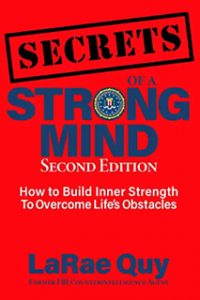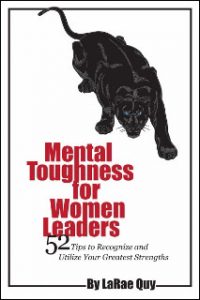Anything worthwhile will require us to learn how to get through adversity. All of us will experience roadblocks in our careers, relationships, finances, and health at some point in life.
If we want to get through adversity, we need to develop a mindset of mental toughness so we can keep on the move. Successful people understand that mindset beats strategy every time.
I learned at an early age that the way I thought about the problems before me would be the way I would overcome them. When my brother and I were kids, Dad pointed out a still used to brew whiskey on our Wyoming ranch. We were on horseback and rode past a few barrel rings and a wall of rocks. Tucked into a steep draw, it was surrounded by aspen trees and a little cow trail that led to the bottom of the canyon near our house.
At that time, my brother and I collected antique glassware as a hobby. We planned to return to the whiskey still and look around for old bottles later. It should be easy enough to find, we thought. So after school, we told our parents we were going out to play and would be back in time for supper. We walked up the canyon, and when we saw a familiar draw, we started up.
Our ranch was located in the scatterings of the Snowy Mountain Range at an altitude of 7,000 feet. Summers are short in that country. When we rode past them a few months before, the green aspen trees that looked lush and cozy were now barren and cold.
Night fell much earlier in the winter months, and dusk had begun to set in. We could not find the whiskey still but continued until we reached the top of the draw. When we saw Laramie Peak in the distance, we knew we had climbed over 500 feet from the canyon bottom.
We had climbed up the wrong draw, night was coming, and we had no flashlights. The rattlesnakes had hibernated for the winter, so that wasn’t a worry, but conditions were still adverse. It was dark; the terrain was steep and rocky. The temperature had begun to drop at an alarming rate.
At ages ten and eleven, my younger brother and I learned how to overcome adversity.
Here are 6 ways that will help you get through adversity as well:
1. Keep Your Eye On The Target
This was not the first time my brother and I had to embrace the suck. Winters are harsh on a Wyoming cattle ranch. We leaned into misery and pushed through our discomfort zones daily. Water in the cattle tanks froze over, and we swung axes to break through three inches of ice. Bales of hay needed to be loaded onto trucks and fed to cattle. The worse the weather, the more our livestock depended upon us for food and water.
Summers were even worse because we fixed fences, greased bailers, trailed cattle, and put up hay instead of playing with the neighborhood kids. Oops, did I mention there were no neighborhood kids because our ranch was so isolated?
The lessons I learned to get down the mountain stayed with me for the rest of my life. I spent four months at the FBI Academy in new agent training. We trained hard, day in and day out, no matter the weather conditions—in snow, wind, rain, or heat. Whenever I thought I couldn’t push myself further, I remembered that cold night climbing back down a mountain when I was eleven. I knew I had what it took to overcome adversity because I’d done it before.
How To Make It Work For You: As entrepreneurs and business leaders, you also need ways to keep your team focused and fired up. High-performance companies provide a vision for a brighter future. This vision keeps employees focused and excited about the future. It prepares them to get through adversity because they can see beyond the current roadblock.
2. Grit Up
My brother and I were unsure how to get back home before we found ourselves in complete darkness and freezing temperatures. We decided that staying with the cow trail would ultimately lead us to our destination. But we’d lost the trail! We hopped over rocks and fallen trees in an attempt to find it.
We developed a strategy: as long we were headed downhill, we were headed in the right direction. The draw had many smaller ones that meandered over the sides of the canyon, and we were tempted at times, but time was important, and we knew the quickest way down was how we came up. We persisted and found the cow path again.
As an FBI agent, there were many times when I needed to grit up and remain persistent if I hoped to solve a case. FBI investigations do not come with instructions on how to solve them. It can take many attempts, failures, and iterations before the answer is found.
How To Make It Work For You: To get through adversity, attack the problem from a different angle if your first or tenth approach doesn’t work. Learn to pivot when needed. Where there is a will, there is a way.
3. Keep A Lid On Emotions
While neither my brother nor I panicked, we were scared—but we never let negativity set in. We acknowledged our fears but remained confident in our ability to get home safely.
I have drawn my weapon while making an arrest. I was scared and afraid of what I would need to do if the person resisted.
It’s always important to acknowledge emotions, but to get through adversity you need to remind yourself that you have the mental toughness to manage the negative ones. You may not be able to change the conditions, but you can change how you deal with them. It’s possible to have self-control in an out-of-control environment.
How To Make It Work For You: You can control your team’s emotions when you get their buy-in. As a leader, help everyone connect with the vision you have. This becomes even more important when things look tough.
4. Accept Responsibility
My brother and I had no one to blame but ourselves. This was no game we were playing, and we had to have the strength to look at our adversity realistically and take responsibility for getting ourselves back home. Our parents had no idea we had headed out to find the whiskey still because we hadn’t told them.
As an FBI agent, I found that self-examination would be one of the most important ways to become a more effective leader and achieve my goals. When confronted with obstacles and adversity, I was unafraid to question my thinking. Often, this self-examination uncovered biases or assumptions I had made that either contributed to the obstacle or stood in my way of overcoming it.
How To Make It Work For You: Self-awareness leads to emotional intelligence—a better understanding of yourself and how you interact with others. A self-examination includes a regular review of values, desires, and fears. This honest assessment can lead to a reinvention of goals and beliefs.
5. Pace Yourself
My brother and I knew that if we stopped, we’d freeze to death before morning. On the other hand, if we depleted our resources, we’d be unable to continue.
I learned it was important to pace myself while running obstacle courses at the FBI Academy. I was not a strong runner, and while I enthusiastically charged out the gate, I knew I’d need to pace myself to last the entire obstacle course.
The same logic applied to my investigations: if I depleted my resources, ran myself to exhaustion, and then needed to respond to a fast-moving break in the case, I was in serious trouble. This can happen in any area of our lives; we move so fast that we fail to recognize what happens around us. Whether alertness or paranoia, it’s always prudent to look to the horizon for threats and opportunities.
How To Make It Work For You: We can work hard but don’t always work smart. To be high performers, we need to pace ourselves because it allows us the time to prioritize our values and what is important to us. To learn more, read the chapter called The 20 Mile March in “Great by Choice” by Jim Collins.
6. Create Community
My brother and I were a team, working together to get back down the hill. We provided moral support for one another. We jumped across waterfalls and mucked through inches of mud to follow the meandering cow path.
The personal leadership skill of camaraderie is one of the first lessons taught at the FBI Academy. New agents are not allowed to leave the Marine Corps base for the first three weeks. Instead, we were expected to develop a supportive community that would be needed during our four months of training.
The concept of total team accountability as part of the culture is a core tenant of SEAL training and life in the “Teams.” From week one, they are taught to hold themselves and their classmates to the highest standard. Peer reviews play a pivotal role in a student’s success. They carry that concept to the Teams as part of their peer-to-peer learning culture. Failure to execute is not an option.
Relating to others was one of the most effective skills I developed as a counterintelligence agent. Everyone needs to be heard. I learned to listen well to others because we all yearn to be understood by others.
My brother and I made it home safely that night to very worried parents.
How To Make It Work For You: Learning how to get through adversity will help you turn underachievement into superior achievement. You are still in the game as long as you can stay alive.
Getty images
© 2018 LaRae Quy. All rights reserved.
Member of Forbes Business Council
Member of Harvard Business Review Advisory Council
You can follow me on Twitter, Facebook, Instagram, AND LinkedIn
Are you mentally tough? Take this evidence-based, FREE Mental Toughness Assessment.
Check out my new online training program at www.SecretsOfAStrongMind.com
Get my book, “Secrets of a Strong Mind (second edition): How To Build Inner Strength To Overcome Life’s Obstacles.”
Author of “Mental Toughness for Women Leaders: 52 Tips To Recognize and Utilize Your Greatest Strengths”







What a story!!
When I’ve been pushed down by adversity and wanted to hide my struggles and challenges, it was reaching out to others that helped me get through it. I was strong and had the grit but knowing I wasn’t alone (even when I was going through things on my own) helped tremendously.
Thanks for sharing this story. I can only imagine being your parents waiting at home for your return!
Alli
Love this post and how you share your childhood challenges with us! All your points are terrific but the one that I really connect with is – Grit up. I have faced both professional obstacles and personal but seeing a problem through a different lens has always helped me. When working with leaders who are upset I always try to help them see things in a familiar way to remind thems how they overcame similar roadblocks in the past.
Thanks LaRae!